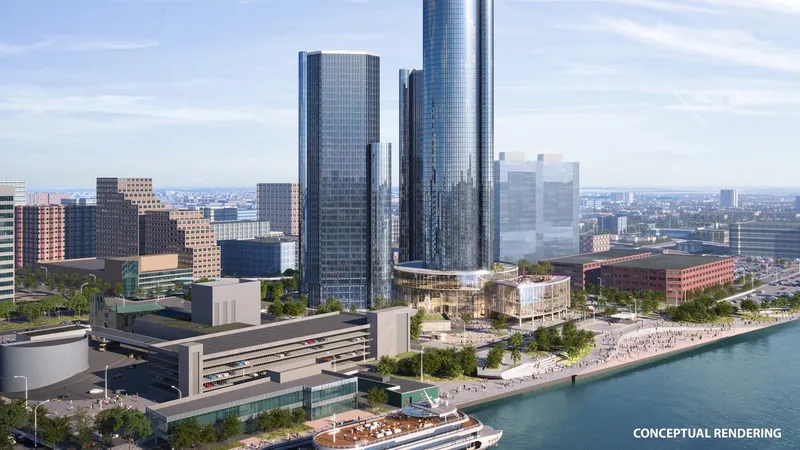
Major Transformation Ahead for Detroit's Renaissance Center: Two Towers to Go, New Park to Emerge!
2024-11-25
Author: Lok
Detroit
— In a bold and ambitious plan, the iconic Renaissance Center in Detroit is set to undergo a sweeping $1.6 billion redevelopment that will see billionaire Dan Gilbert’s real estate firm Bedrock and General Motors Co. co-own the complex. The proposal involves shrinking the RenCen’s current five-tower structure down to three by demolishing Towers 300 and 400. This will pave the way for the creation of a stunning six-acre riverfront park, enhancing public access to the Detroit Riverwalk.
A Shift in the Skyline and Land Use
This renovation plan, described as a "right-sizing" effort by Bedrock Detroit CEO Kofi Bonner, aims to revitalize the RenCen to reflect modern demands for mixed-use spaces featuring residential, office, and hotel functions. The estimated cost requires approximately $250 million in state subsidies and an additional $100 million from Detroit's Downtown Development Authority, primarily sourced through tax-increment financing.
Funding Insights and Challenges
Gilbert's equity and debt contributions will account for a whopping $1 billion, while GM is stepping up with a significant $250 million after previously pouring $1.5 billion into the complex. However, the request for taxpayer support has faced skepticism from local real estate experts and state lawmakers. Critics like Jim Becker emphasize that demolishing two towers could potentially impede some of the best views along the riverfront, sparking concerns about the return on investment for taxpayers.
Reimagining Spaces for Modern Living
Plans for the central tower, which currently houses a Marriott hotel, include a reduction of rooms from approximately 1,200 to around 850, while earmarking the upper floors for 200 upscale family apartments. A remaining tower is poised to convert to residential apartments, aiming for an estimated 300 to 400 units, while another tower will remain as office space.
Entertainment and Community Experience
The proposed park aims to replicate attractions reminiscent of Chicago's Navy Pier or London's O2 Arena, creating a dynamic space for events and dining experiences with the potential for sports and cultural programming. Discussions have even taken place with an internationally recognized automobile entertainment concept that would honor the historical significance of the site.
Community Response and Future Considerations
While residents and businesses hold mixed views on the upcoming changes, many express hopes for revitalization. Joe Vicari, owner of local restaurants in Tower 400, is cautiously optimistic but underscores the struggles faced since the pandemic reduced foot traffic. Furthermore, concerns about more publicly funded redevelopment exist, with calls for transparency on how taxpayer dollars will be used to support these projects.
A Landmark's New Chapter
Originally opened in 1977, the Renaissance Center remains a significant part of Detroit's skyline, and its origins trace back to aims of revitalizing the city post the 1967 uprising. With the headquarters transfer planned for GM, who will relocate to the Hudson’s Detroit development in early 2026, the fate of the RenCen hangs in the balance.
As the clock ticks, demolition could begin within two years, with construction targeting a timeline of two to three years to bring the community's vision to life. The redevelopment plan not only promises modern living but also emphasizes the importance of a vibrant public space to attract residents and tourists alike.
Will the vision for the Renaissance Center materialize, or will it face further pushback? Only time will tell as Detroit stands on the cusp of a transformation that could redefine its urban landscape. Stay tuned for more updates on this evolving story!





 Brasil (PT)
Brasil (PT)
 Canada (EN)
Canada (EN)
 Chile (ES)
Chile (ES)
 España (ES)
España (ES)
 France (FR)
France (FR)
 Hong Kong (EN)
Hong Kong (EN)
 Italia (IT)
Italia (IT)
 日本 (JA)
日本 (JA)
 Magyarország (HU)
Magyarország (HU)
 Norge (NO)
Norge (NO)
 Polska (PL)
Polska (PL)
 Schweiz (DE)
Schweiz (DE)
 Singapore (EN)
Singapore (EN)
 Sverige (SV)
Sverige (SV)
 Suomi (FI)
Suomi (FI)
 Türkiye (TR)
Türkiye (TR)